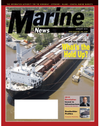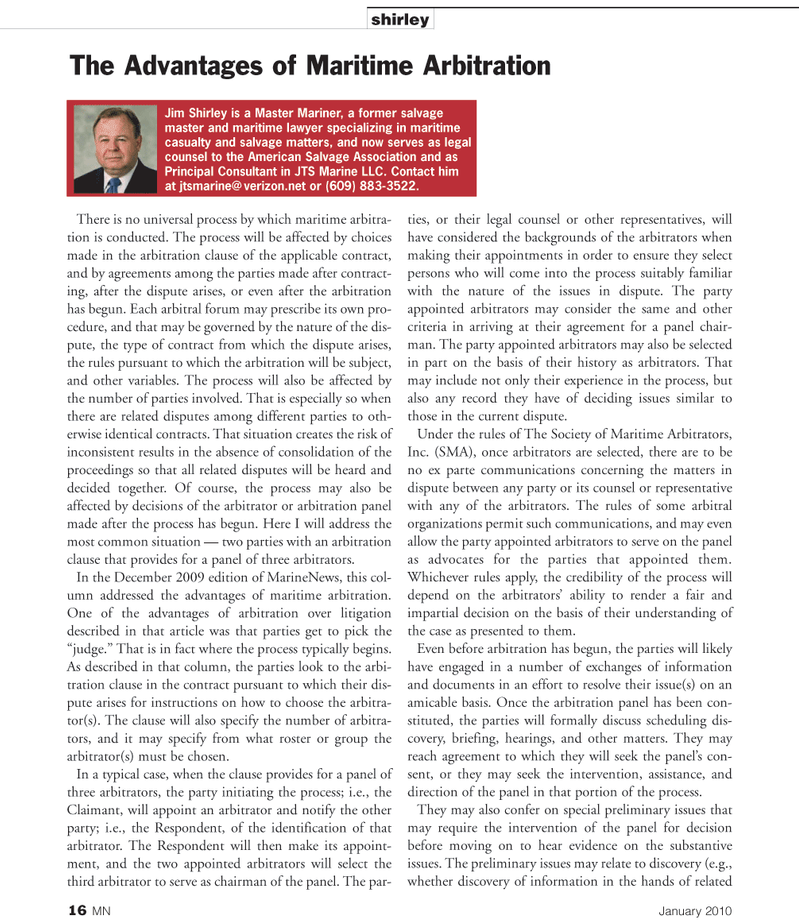
Page 16: of Marine News Magazine (January 2, 2010)
Read this page in Pdf, Flash or Html5 edition of January 2, 2010 Marine News Magazine
16 MN January 2010
There is no universal process by which maritime arbitra- tion is conducted. The process will be affected by choices made in the arbitration clause of the applicable contract, and by agreements among the parties made after contract- ing, after the dispute arises, or even after the arbitration has begun. Each arbitral forum may prescribe its own pro- cedure, and that may be governed by the nature of the dis- pute, the type of contract from which the dispute arises, the rules pursuant to which the arbitration will be subject, and other variables. The process will also be affected by the number of parties involved. That is especially so when there are related disputes among different parties to oth- erwise identical contracts. That situation creates the risk of inconsistent results in the absence of consolidation of the proceedings so that all related disputes will be heard and decided together. Of course, the process may also be affected by decisions of the arbitrator or arbitration panel made after the process has begun. Here I will address the most common situation — two parties with an arbitration clause that provides for a panel of three arbitrators.
In the December 2009 edition of MarineNews, this col- umn addressed the advantages of maritime arbitration.
One of the advantages of arbitration over litigation described in that article was that parties get to pick the “judge.” That is in fact where the process typically begins.
As described in that column, the parties look to the arbi- tration clause in the contract pursuant to which their dis- pute arises for instructions on how to choose the arbitra- tor(s). The clause will also specify the number of arbitra- tors, and it may specify from what roster or group the arbitrator(s) must be chosen.
In a typical case, when the clause provides for a panel of three arbitrators, the party initiating the process; i.e., the
Claimant, will appoint an arbitrator and notify the other party; i.e., the Respondent, of the identification of that arbitrator. The Respondent will then make its appoint- ment, and the two appointed arbitrators will select the third arbitrator to serve as chairman of the panel. The par- ties, or their legal counsel or other representatives, will have considered the backgrounds of the arbitrators when making their appointments in order to ensure they select persons who will come into the process suitably familiar with the nature of the issues in dispute. The party appointed arbitrators may consider the same and other criteria in arriving at their agreement for a panel chair- man. The party appointed arbitrators may also be selected in part on the basis of their history as arbitrators. That may include not only their experience in the process, but also any record they have of deciding issues similar to those in the current dispute.
Under the rules of The Society of Maritime Arbitrators,
Inc. (SMA), once arbitrators are selected, there are to be no ex parte communications concerning the matters in dispute between any party or its counsel or representative with any of the arbitrators. The rules of some arbitral organizations permit such communications, and may even allow the party appointed arbitrators to serve on the panel as advocates for the parties that appointed them.
Whichever rules apply, the credibility of the process will depend on the arbitrators’ ability to render a fair and impartial decision on the basis of their understanding of the case as presented to them.
Even before arbitration has begun, the parties will likely have engaged in a number of exchanges of information and documents in an effort to resolve their issue(s) on an amicable basis. Once the arbitration panel has been con- stituted, the parties will formally discuss scheduling dis- covery, briefing, hearings, and other matters. They may reach agreement to which they will seek the panel’s con- sent, or they may seek the intervention, assistance, and direction of the panel in that portion of the process.
They may also confer on special preliminary issues that may require the intervention of the panel for decision before moving on to hear evidence on the substantive issues. The preliminary issues may relate to discovery (e.g., whether discovery of information in the hands of related shirley
The Advantages of Maritime Arbitration
Jim Shirley is a Master Mariner, a former salvage master and maritime lawyer specializing in maritime casualty and salvage matters, and now serves as legal counsel to the American Salvage Association and as
Principal Consultant in JTS Marine LLC. Contact him at jtsmarine@ verizon.net or (609) 883-3522.

 15
15

 17
17
